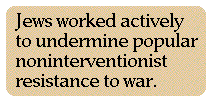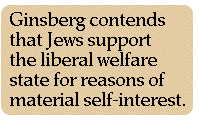".... Benjamin Ginsberg's The Fatal Embrace: Jews and the State, which deals with the rise and fall of Jews in different societies, is an intellectual bombshell. A liberal American Jew who teaches political science at Johns Hopkins, Ginsberg makes observations about Jewish influence in government and society that would be deemed anti-Semitic if expressed by a Gentile. Ginsberg, however, does not criticize that Jewish power for being harmful to Gentiles; his only concern is the harm it can cause for Jews by provoking Gentiles to anti-Semitic actions... "
".... Ginsberg devotes the greatest part of his book to the history of Jewish power in America. German Jews gained significant power in the United States after the Civil War, largely in the realm of finance. Jews financed the U.S. regime's Civil War debt, the debts of the reconstructed Southern states, and the nascent industries. In essence, according to our author, Jews were a part of the new business and industrial class of the Gilded Age, and became "identified with the worst excesses of the nineteenth-century industrial order." (p. 75) Jewish prominence induced an anti-Semitic opposition from Southern and Western agrarians (Populists), and from old-stock New England patricians. Reacting to that anti-Semitic criticism, the Gentile business class jettisoned its ties with the Jews and aligned itself with the patricians. Thus, the 1890s saw the emergence both of exclusive clubs that barred Jews and of anti-Jewish quotas in the Ivy League colleges. Having been thrust out of the business elite, Jews sought to alter the American economic system, Ginsberg writes. They identified with the Progressive reform movement and — on the part of the newly immigrating Eastern European Jews — with radical socialism. The Jewish role in the Progressive movement crested in the Wilson administration, with Louis Brandeis playing a major role in the creation of the Federal Reserve System and the Federal Trade Commission. However, the Jewish rise was transitory, cut short by the anti-radical Red Scare in the aftermath of World War I, which destroyed radical and reform movements as well as (in Ginsberg's view) an emerging welfare state.
It was with Franklin Roosevelt's New Deal that Jews gained long-term power in the United States, power that continues into the present.
 Jews served as Roosevelt's idea men and staffed his New Deal agencies. They played a fundamental part in fashioning the centralized American welfare state — and Ginsberg asserts that they created it to serve their own interests. In contrast to American Protestants' success in the private sector, Ginsberg writes that Jews "relied upon the state and the public economy to achieve positions of influence and status in American society." (p. 103) That account contrasts, we should note, with Thomas Sowell's portrayal of Jewish success via the free market.
Jews served as Roosevelt's idea men and staffed his New Deal agencies. They played a fundamental part in fashioning the centralized American welfare state — and Ginsberg asserts that they created it to serve their own interests. In contrast to American Protestants' success in the private sector, Ginsberg writes that Jews "relied upon the state and the public economy to achieve positions of influence and status in American society." (p. 103) That account contrasts, we should note, with Thomas Sowell's portrayal of Jewish success via the free market.Jews also played a significant role in getting the United States into World War II to destroy their Nazi nemesis. And they worked actively to undermine popular noninterventionist resistance to war. For example, the Anti-Defamation League "employed investigative agents who secretly penetrated isolationist and anti-Semitic organizations and collected potentially damaging or incriminating information" which it turned over to the FBI and other federal agencies. (p. 110) Ginsberg does not develop this point, but given the fact that the overwhelming majority of "isolationists" were not enemy agents and were simply exercising their constitutional right to oppose a policy, it is apparent that activist American Jews have been quite willing to crush the civil liberties of others in order to advance their own goals. Jews also played a critical part in turning the media toward a prowar stance. (That was quite an achievement, since the American mood in the 1930s was strongly antiwar and "isolationist.") In Hollywood, Jewish film makers concentrated on producing anti-Nazi propaganda films to prepare the masses for a crusade against evil.
In the immediate postwar period, right-wing attacks on Communist subversion put Jews on the defensive. Since Jews had been numerous in the American Communist Party, to them the attacks reeked of anti-Semitism. But by joining forces with the also-imperiled WASP elite, Jews were able to destroy the threat by exercising their media power. They did not just succeed in downplaying the idea of Communist subversion; they were even able to change the issue from Communist subversion to the right-wing threat to American civil liberties. That was quite a striking ideological turnaround from the Jews' total disregard of the civil liberties of pre-World War II "isolationists." The Jewish success against the right-wing danger meant that by the late 1950s, "conservative anti-Communists who sought to maintain a modicum of respectability ... carefully avoided the least hint of anti-Semitism." (p. 125) Ginsberg cites William F. Buckley Jr. as an example.
In the 1960s, the Jews played key roles in the civil rights revolution and the concomitant Great Society programs. For Jews, Ginsberg points out, support for black civil rights was not only a "moral commitment" but also an "important political tactic" to weaken the white South and the ethnic machine politicians in the North, and, as a consequence, increase their own relative power within the Democratic coalition. Moreover, the advancement of the concept of "equality of opportunity" bolstered Jewish power throughout society. (pp. 125-26) Jews opposed the Vietnam War because it inhibited the expansion of those liberal Great Society programs in which their power resided.
By the end of the Great Society reforms, Jews, in Ginsberg's view, had become the major force in American politics and government:
 "From the 1970s onward, Jews led or were influential in most, though not all, of the political reform, feminist, consumer rights, gay rights, environmentalist and other public interest groups and related foundations, study groups, and think tanks that came to dominate the Democratic party during the 1970s and continue to be the leading forces within that party today." (p. 137) And Jews wield considerable power in the institutions of the American welfare state, holding as they do prominent positions in the "public or quasi-public economy of government agencies, helping professions, private foundations, think tanks, and universities." (p. 140) Since Jewish power and wealth is either directly or indirectly tied to the national government, rather than to state and local governments or to the strictly private sector, Jews have a vested interest in its maintenance and expansion. In short, Ginsberg contends, Jews support the liberal welfare state for reasons of material self-interest: "Jewish liberalism is more an institutional than an attitudinal phenomenon. It is associated more with Jews' political linkages and involvements than with their underlying attitudes." (p. 143)
"From the 1970s onward, Jews led or were influential in most, though not all, of the political reform, feminist, consumer rights, gay rights, environmentalist and other public interest groups and related foundations, study groups, and think tanks that came to dominate the Democratic party during the 1970s and continue to be the leading forces within that party today." (p. 137) And Jews wield considerable power in the institutions of the American welfare state, holding as they do prominent positions in the "public or quasi-public economy of government agencies, helping professions, private foundations, think tanks, and universities." (p. 140) Since Jewish power and wealth is either directly or indirectly tied to the national government, rather than to state and local governments or to the strictly private sector, Jews have a vested interest in its maintenance and expansion. In short, Ginsberg contends, Jews support the liberal welfare state for reasons of material self-interest: "Jewish liberalism is more an institutional than an attitudinal phenomenon. It is associated more with Jews' political linkages and involvements than with their underlying attitudes." (p. 143)Ginsberg attributes the rise of black anti-Semitism over the past couple decades to the desire of upwardly mobile blacks to share in the positions of power held by Jews in the welfare-state apparatus. Jews may oppose some black activities, but they cannot become too critical of blacks because it is the idea of helping disadvantaged blacks that provides the "legitimation of the American welfare state." Indeed, Ginsberg maintains, "Many Jews and Jewish organizations believe that the fundamental interests of Jews are so closely tied, both politically and institutionally, to those of blacks, that it is sometimes necessary to support black demands even when, conceived narrowly or in the short term, these seem to be disadvantageous to Jews." (p. 165) It is that vested interest in the liberal welfare state that prevented most Jews from turning to Republicanism in the 1980s despite the Republicans' support for pro-Jewish positions on racial quotas and the defense of Israel.
Although the overwhelming majority of Jews did not turn to Reagan Republicanism in the 1980s, "Jews played important roles in implementing the administration's economic and foreign policy objectives," Ginsberg writes. "The association of Jews with Reaganism, especially in the realm of foreign policy, helped to heighten the anti-Semitism of forces on the political Left but produced a measure of philo-Semitism on the right, most notably among Protestant fundamentalists." (p. 188) Neoconservative Reaganauts identified Israel as America's "strategic asset" in the Cold War, and Israel actually helped the United States fight communism in Latin America and elsewhere. In the economic realm, Jewish parvenu financiers such as Michael Milken were the major beneficiaries of the Reagan rollback of regulations.
Ginsberg claims that the Republicans, unable to attract any significant number of Jews to their side, abandoned their support of the neocon elite with the end of the Cold War. Israel simply was no longer needed as an ally. Thus President Bush and Secretary of State James Baker tried to coerce Israel into following American Middle East policy and in so doing alienated their neoconservative support. Ginsberg, who completed Fatal Embrace at the beginning of the Clinton administration, emphasizes the large number of Jews who were entering that regime, reinforcing his theme of American Jewry's continued identification with liberal Democrats.... "